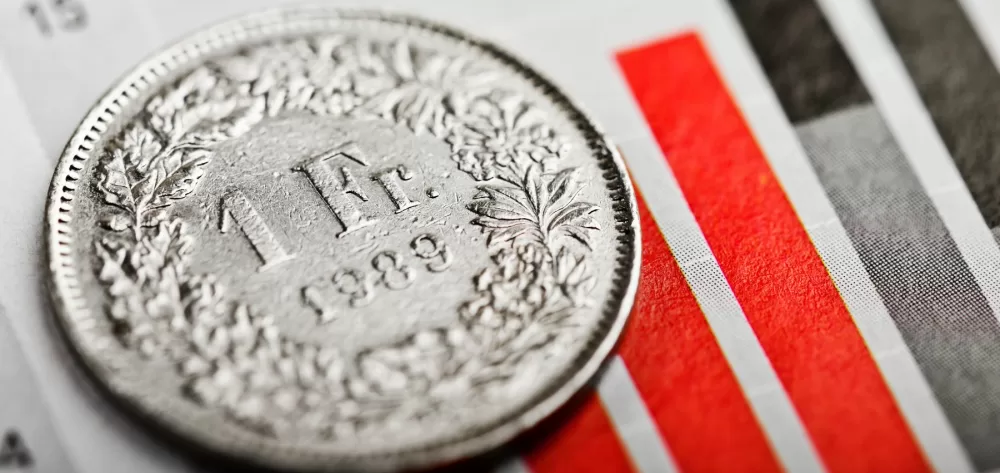Since the fixed minimum euro-to-franc exchange rate was done away way in 2015, the Swiss franc has continually gained against the Eurozone’s common currency. The franc reached parity with the euro in 2022. Find out what that means for Switzerland and how you as a consumer can profit from it in this report from independent Swiss comparison service moneyland.ch.
As a basic rule, the stronger the franc gets, the stronger these effects are felt. The euro-franc parity itself has symbolic significance, as it represents a psychological barrier which has not been broken since the floor was first removed from the euro-to-franc exchange rate. The crossing of the threshold itself does not bring any major changes, but simply amplifies the existing effects of the strong Swiss franc.
Shopping tourism pays off
For many products, there are massive differences between prices charged in Switzerland and in neighboring countries. Additionally, you can reclaim value added tax on your foreign purchases. For many residents of Switzerland, just those factors provide good enough reasons to shop across the border – regardless of the going exchange rate. If prices in other countries remain the same, but the franc gets stronger, shopping tourism enables even bigger savings. A product which would cost the equivalent of 11 francs at 1.10 francs to the euro costs just 10 francs when the franc and euro are equal.
According to a report from the Federal Council, the strength of the Swiss franc is a strong contributor to price disparities between Switzerland and neighboring countries. From 2008 to 2017, the difference has climbed from 20 to more than 60 percent. That does not mean that all products are cheaper abroad – it all depends on the specific goods and services in question. For example, certain cosmetics and personal hygiene products cost far less in Germany than in Switzerland. On the other hand, many electronics have lower price tags in Switzerland than in many EU countries. Comparing prices always makes sense.
Buying from online stores in neighboring countries also becomes more attractive when the franc is strong. But it is important to account for the cost of delivery and customs duties. In some cases, these are so high that you end up paying more than you would pay for orders from Swiss online stores.
Obviously, the Swiss economy suffers when residents spend their money abroad. Estimates place the cost of shopping tourism for Swiss businesses at billions of francs per year.
Cheaper holidays abroad
The strong Swiss franc is a boon for anyone looking to travel abroad, because they pay less for the same things. A holiday which costs a total of 2000 euros would cost you 2200 francs when the exchange rate is 1.10 francs to the euro. When the franc and euro are equal, the same vacation costs you 200 francs less.
The savings are often difficult to see when you make travel bookings with Swiss travel service providers, because prices are quoted in Swiss francs. You also have to track prices constantly in order to notice whether or not they have actually changed to match the new exchange rate. Because of this, it is beneficial to check websites in which prices are quoted in euros, or book at hotels in Eurozone countries directly. You can find more savings tips for hotel bookings here.
Less tourists visit Switzerland
While the strong franc means Swiss pay less for holidays abroad, it also means that holidays in Switzerland are more expensive for people visiting from other countries. The stronger the franc gets against the euro, the higher the prices in Switzerland are for tourists from Eurozone countries. The is similar to the effects of a strong Swiss franc on companies which export goods and services to other countries (more on this below). What sets the tourism sector apart is that it is geographically bound to Switzerland, and cannot outsource production to other countries. It also hardly profits from low import costs. So the strength of the Swiss franc is almost entirely disadvantageous for Swiss tourism.
A study by the Graduate Institute Geneva shows that overnight stays by Belgian, Dutch, and German tourists, in particular, notably decrease when the franc strengthens against the euro. Altogether, a 10-percent increase in the value of the franc results in a 10-percent decrease in hotel stays from European visitors. Business trips, on the other hand, are rarely affected by changes in the exchange rate. This means urban tourism is normally less affected than rural tourism.
For you as a Swiss resident, the cost of local hotel stays, ski holidays, and other travel within Switzerland is not affected – unless the overall economic situation leads to price increases.
Export-based companies suffer
The strong Swiss franc is problematic for Swiss companies which export goods and services. The lower the euro-to-franc exchange rate is, the less money they earn. Example: A Swiss machine manufacturer sells its products in France. Its French customer pays 100,000 euros per machine. At an exchange rate of 1.10 francs to the euro, the value of each sale is 110,000 francs. One year later, the exchange rate reaches parity at 1 euro to 1 franc. Unless the manufacturer raises the price of its machines, it will only earn 100,000 francs per sale – 10,000 francs less than it earned a year earlier.
To avoid losses, some Swiss manufacturers are forced to raise the price of their export products to compensate. The result is that Swiss products become more expensive for foreign customers. In the worst case, Swiss companies can lose foreign customers because their prices are no longer competitive.
Every year, Swiss companies sell more than 300 billion francs worth of manufactured goods outside of Switzerland. Around half of these products are sold in EU countries. So the euro-franc rate plays a central role for export-based Swiss companies. Sectors which are most dependent on exports include the chemical and pharmaceutical sectors, and the machine and watch industries.
Import-based companies benefit
For companies which import goods and services, a strong Swiss franc is a good thing. They profit from the franc-to-euro parity to the same extent that exporting companies suffer from it. The value of annual imports into Switzerland is also nearly 300 billion francs. More than half of those imports come from European countries.
Unfortunately, that does not mean you as a consumer benefit from the lower costs of importing foreign goods. Swiss importers are not obligated to pass on extra profits earned on exchange rates to customers – and many of them hardly lower their price tags to match, or do not reduce prices at all.
Investing abroad gets cheaper
A strong franc means Swiss investors can get more foreign assets for less. As with prices for consumer goods and services, the strong the franc is, the less francs you have to invest to get the same amount of assets. For example, investing in a stock which costs 100 euros would cost you 110 francs at an exchange rate of 1.10 francs to the euro. But when a euro costs just 1 franc, you only have to invest 100 francs to get the same stock, even though the nominal price of the stock has not changed.
But it is important to understand that if the Swiss franc were to keep gaining value after you make the investment, then the value of the euro-denominated stock in Swiss francs will go down. In this case, you could make a loss simply because of the unfavorable currency exchange rate. If the stock’s market price remains more or less the same, then the only way you would profit from selling it is if the franc loses value.
If you already own euro-denominated stocks, selling these at a time when the Swiss franc is strong against the euro is unfavorable for the same reasons. Depending on the situation, waiting until the franc loses value before selling can be advantageous.
You can easily find out which Swiss stock brokers let you trade on different European exchanges using the interactive online trading comparison on moneyland.ch.
Inflation
If inflation rates in Eurozone countries climb much less than those in Switzerland, then the higher value of a strong Swiss franc can compensate for the resulting price increases in EU countries. In this case, although the purchasing power of the franc is higher than that of the euro, the higher prices mean you have to pay more Swiss francs for your purchases. If, for example, you want to take a holiday abroad while the euro is weak, make sure to account for inflation in the country you want to travel to. A strong Swiss franc will not benefit you if you spend your money in a country where prices have gone up much faster than in Switzerland.
More on this topic:
Compare Swiss online stock brokers now
Useful tips for cheaper hotel stays






